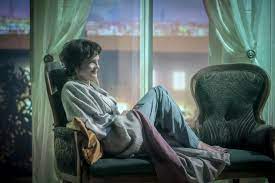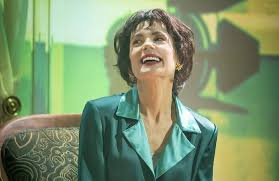"Hell, I suppose if you stick around long enough they have to say something nice about you" - Ava Gardner
Ava Gardner died, aged 67, in London, in January 1990 so she didn't stick around long enough to hear people saying nice, and not so nice, things about her at the Riverside Studios in Hammersmith last night - and, a little disappointingly, nor did many other people.
The theatre was somewhere between a quarter and a third full and when that happens, in the theatre - it doesn't matter at the cinema, I always feel sorry for everyone involved. The crew, the director, the theatre owners but, most of all, the actors. I imagine I'd find it hard to motivate myself to perform to such a sparse crowd which, perhaps, explains why I never became a thespian.
Elizabeth McGovern (Downton Abbey, War of The Worlds) and Anatol Yusef (Boardwalk Empire and a whole load of Shakespeare on stage) didn't have that problem though. They're professionals and their minds stayed focused on the job in hand. Their hearts too, it seemed. Because Ava:The Secret Conversations (directed by Karl Sydow and based on a book Peter Evans, who Yusef plays, wrote with Gardner herself, played by McGovern, while she was living in London towards the end of her life) feels like a project that comes from the heart.
It wants to say profound and important things about the nature of fame, how famous female lives are played out in public, and how women are often viewed through the prism of the men in their lives. It wants to say these things and it very nearly does. But, for some reason, it never quite gets there. While Ava was a thoroughly interesting, and even engaging, play I never found myself fully emotionally invested in either Ava Gardner's life or Peter Evans's attempts to penetrate it.
Evans is all clipped vowels, smart clothes, and impeccable manners. A proper English gentleman who we see reporting in to his editor Ed (an off screen voice seemingly obsessed with getting some sleaze on Gardner) on how his biography of the movie star is going but, in scenes that are at first a little jarring, he seems to merge into Gardner's former lovers when he interviews her about them.
It's not apparent if this is being done for effect or if Evans really believes himself to be taken over by the spirits of these men. Certainly, Evans finds himself so emotionally compromised by what's happening to him that, at one point, he offers to recuse himself from the entire project.
It's not as if these lovers are people we've never heard of either. Gardner's first husband was the former child star, and then one of the world's most famous actors, Mickey Rooney. After Rooney, she wed the world famous jazz clarinettist Artie Shaw, and to complete the triumvirate of celebrity husbands she signed off with the biggest of all.
Ol' Blue Eyes himself. The kid from Hoboken who got the breaks. Frank Sinatra. As if all that wasn't juicy enough there was even a lengthy affair with the eccentric magnate and pilot Howard Hughes. Gardner, still boozing, still swearing, and still quite flirty and horny, doesn't, initially, want to talk about her love life and thinks the book should be more about the recent stroke she's suffered and a huge list of films she starred in ranging from Robert Siodmark's The Killers in 1964 to 1974's disaster movie Earthquake and taking in Show Boat, The Barefoot Contessa, and The Life and Times of Judge Roy Bean.
She's also not keen on talking about her upbringing on a sharecropper's farm in North Carolina (they were "poor" yes, sometimes even "broke" but they weren't "dirt poor") and she seems to set rules for others that she does not adhere to herself. She asks Evans to cut the swearing from the book, he says no - that's how she talks and it makes it more real, but she has no intention of cutting swearing from her own life.
So when she casts aspersions on her lovers you have to wonder how much is truth and how much is projection. Rooney was a child who never grew up - but the sex was great, Artie Shaw was controlling, and Sinatra was either a self-pitying layabout or a high flyer with links, it's long been hinted, to the Mafia. Ed's insistence that Evans gets the low down on Sinatra's supposedly massive cock come to nothing.
Howard Hughes comes out worst of all. He never took a bath, he was physically and verbally abusive, and, it seems, he even raped Gardner. Of course, she seems to have no real problem with any of this and it's because of this bizarre way of processing life that McGovern's Gardner can be difficult to identify with or even root for.
As the play moves on, taking in stories of Lena Horne, Elizabeth Taylor, Clark Gable, and Omar Sharif - and occasionally utilising film footage of the real life protagonists, Evans provokes Gardner into more honest recollections and, occasionally, booze fuelled tantrums that answer a few questions but these secret conversations seem to muddy the waters of Gardner's incredible life just as much as they clear them.
I left knowing a lot more about Ava Gardner's career, and her love life, than I had entered with but I'm not sure I learnt as much about Gardner as a person than I did about Evans. Perhaps that's why the theatre wasn't full. A valiant effort but, ultimately, only a partial success.






No comments:
Post a Comment